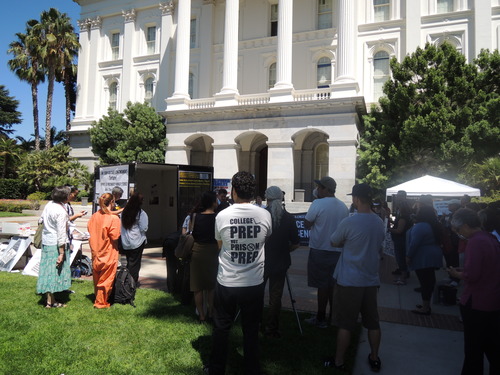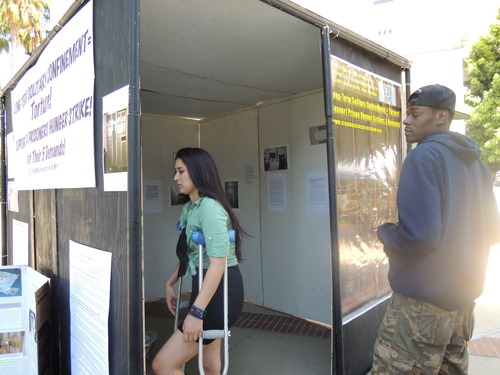California Prisoners' Hunger Strike:
The Humanity of the Prisoners vs. the Inhumanity of the System
by Larry Everest | August 25, 2013 | Revolution Newspaper | revcom.us
Sunday, August 18, marks Day 42 in the intense, life-and-death struggle California prisoners are waging for their humanity and basic rights—especially an end to long-term, indefinite solitary confinement, which is a form of torture—and widely labeled as such by international legal and human rights groups.
Right now, the lives of hundreds of hunger striking prisoners are on the line due to the vicious response of prison authorities to this struggle—refusing to grant the prisoners' just demands and instead retaliating against them. Prisoner supporters say this is a "very dangerous phase of their protest" and "their health could be permanently damaged by their refusal to eat solid foods; they could even die."

At dawn on August 14, 2013 activists from Stop Mass Incarceration assembled a solitary SHU cell replica on the cement plaza at the South Steps of the California State Capitol in Sacramento. Photo: Special to Revolution
The latest round of this battle began on July 8, when 30,000 prisoners in 22 of California's 33 prisons went on hunger strike—the largest political action by prisoners in the state's history.* Nearly 200 prisoners (by official count) remain on hunger strike (and in all likelihood many, many more are either on hunger strike or supporting the struggle in other ways)—including nearly 100 who have been refusing meals for 40 days straight!
According to the Los Angeles Times (August 14), "California's prison hunger strike is now in its sixth week, and the number of inmate protesters requiring medical care has increased significantly. According to medical guidelines created by foreign governments for monitoring hunger strikes in other countries, after a month without food, protesters can experience nerve damage that causes difficulty swallowing and vomiting. After 40 days, the expected effects include progressive confusion, incoherence, loss of vision and hearing, and bleeding." The Los Angeles Times also reports that during the past week alone, 93 prisoners suffering from "dehydration and abdominal pain" required medical attention, and that prison authorities are "emptying beds in preparation for handling inmates who have been on a hunger strike."

All day on August 14 legislators and their aides hurried by, some averting their eyes and muttering inaudibly, with a few stopping and peeking into the interior. A mariachi group stopped to talk with activists and family members, tourists wandered in, leaning close to read the statements of the strike reps, or to study the art of Bill Michael Sell, the prisoner who died during the hunger strike. Throughout the day several hundred people stopped to look, read prisoners' statements or study the pictures of prison cells. Photo: Special to Revolution
"Legal advocates continue to receive reports of ill treatment and indifference by both guards and prison medical staff," Prison Hunger Strike Solidarity wrote on August 16.
The courageous action of these prisoners is being supported by thousands and thousands of people across the country. This includes a very active core of family members whose loved ones' lives are in jeopardy, activists and prisoner supporters who've staged dozens of demonstrations, vigils, and other protests on a near-daily basis, as well as prominent voices from activists and entertainers Mavis and Jay Leno, Susan Bay and Leonard Nimoy, singer Bonnie Raitt, Cornel West, Noam Chomsky, actor and author Peter Coyote, Gloria Steinem, Rev. Jesse Jackson, cinematographer and director Haskell Wexler , and actors and activists Mike Farrell, Ed Asner, and Jamie Cromwell.
On August 14, the Stop Mass Incarceration Network, State Senator Tom Ammiano, California Families Against Solitary Confinement, and the National Religious Campaign Against Torture combined to stage a very impactful installation of a life-sized SHU cell and protest right on the steps of the state capitol in Sacramento, that drew 100 people, with several hundred more visiting the all-day SHU installation. (See, Day 38 of the California Prisoners Hunger Strike: Life – Sized SHU Cell Installed on State Capitol Steps—100 people rally to protest Prison Torture and Support Prisoners 5 Demands.)
Vicious Response
Faced with the prisoners' strength and determination, and the courageous protest, the state has lashed back, trying to crush the spirits and very lives of the prisoners, their families, and whole sections of the population—and to harden the hearts and deaden the humanity of society more broadly.
The State of California and prison authorities have retaliated against hunger strikers—trying to further isolate some in Ad Seg (administrative segregation), blowing cold air into their cells, depriving them of liquids and medicines in some cases, and issuing disciplinary infractions. They've refused to even negotiate with the prisoners—claiming by refusing food the prisoners are threatening and intimidating their jailers and torturers! "We are not going to make policy decisions under threats and intimidation," prison spokeswoman Terry Thornton said on August 13. (And it should be noted that no leading representative of the imperialist system—whether the President, prominent judges, members of Congress, or other spokespeople for the system have condemned the actions of California's authorities against the hunger strike; most have remained totally silent, thereby supporting the California Department of Corrections and Rehabilitation's [CDCR] actions.)
A Criminal System
Prison authorities, including prison head Jeffrey Beard, and the system's media are calling the prisoners predators and animals who deserve whatever violence and abuse the system dishes out. As the Revolutionary Communist Party, LA Branch wrote in response to Jeffrey Beard's Los Angeles Times op-ed (see Revolution #313):
"In Beard's op-ed, he plays on consciously crafted public opinion about 'irredeemable criminals' we should be glad are locked away. But the deeper reality is that it is this system that is criminal and without legitimacy. It is this system that is committing crimes against humanity, torturing tens of thousands of people within its own borders and turning generation after generation of Black and Latino youth into suspects before they have even grown to their full height. It locks people into conditions where they are set against each other, blames them for reacting in ways this system trains them to react and then condemns them further when they put their lives on the line to rise above this and assert their humanity." ("What Is Actually Revealed in the California Prisoners Hunger Strike? Responding to Jeffrey Beard's Los Angeles Times Op-ed," from the Revolutionary Communist Party, LA Branch).
Let's face it: the logic of the system here is the logic of genocide, the logic of death camps. As former SHU inmate and current UC Berkeley student Steven Czifra said at the August 14 protest outside the California State Capitol, the prison authorities would just as soon kill all the SHU prisoners and then just replace them with others.
A system like this, with no future at all for millions, is a criminal system.
A Critical Juncture
The prisoners' hunger strike is at a critical juncture. This is a battle not only for those on hunger strike, or even California's 133,000 prisoners, but for the millions the U.S. of A. has criminalized, demonized, and cast off from birth—and for what kind of a society and world we'll live in.
As the Statement from the LA Branch of the RCP put it: "If you want to live in a world where the energy and creativity of the millions locked behind steel cages can truly flourish... where there are no more antagonistic social divisions that twist all human relations today... where people work and struggle together for the common good... where everyone contributes whatever they can to society and gets back what they need to live a life worthy of human beings... be part of the movement for revolution to make this real."
Demand an end to torture in U.S. prisons. Have the prisoners' backs!
* Prisoners have five core demands including: 1) End Group Punishment & Administrative Abuse; 2) Abolish the Debriefing Policy, and Modify Active/Inactive Gang Status Criteria; 3) Comply with 2006 Prison Commission Recommendations on ending Long-Term Solitary Confinement; 4) Provide Adequate and Nutritious Food; 5) Expand and Provide Constructive Programming and Privileges for Indefinite SHU Status Inmates. [back]
If you like this article, subscribe, donate to and sustain Revolution newspaper.
